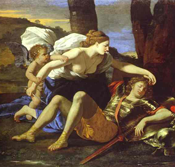On February 4th, the Clarice Smith Performing Arts Center in College Park MD hosted a
concert performance of the original Armide – the 1686 masterpiece by Jean-Baptiste Lully; in
April, the collaborators will offer a fully staged production of the 1777 Armide by Christoph
Willibald Gluck, who resolved to conquer Paris by confronting the most famous creation of his
illustrious predecessor.
Lully’s Armide, an enduring hit on the French operatic stage for a century after its premiere, is
not often heard these days – particularly live. So, even unstaged, Opera Lafayette’s production of
this brilliant, complex score was a rare treat to both the early music fans and the generally
curious who packed the sold-out Dekelboum concert hall last Saturday afternoon. The 16-piece
choir and a period instrument ensemble supported an international – and internationally
acclaimed – group of soloists, some with most impressive baroque opera credentials. The casting
evidently aimed at creating an ingenious mirror to Quinault’s well-known storyline, for it was
dominated by Stephanie Houtzeel’s Armide. Tall, with regal posture, clad in blazing red jacket,
the warrior princess ruled her universe with supreme confidence, commanding both respect and
admiration of the troupes with her vocal power, range, and technique. Almost uncomfortable at
times in its intense expressivity, Houtzeel’s performance was a reminder that the line between
high drama and embarrassing melodrama on the 17th-century French stage would probably
appear rather blurred to us.
In her interactions with other characters, Armide – in yet another hommage to Quinault – found
herself conquered, on occasion, by the “implacable” Renaud of Robert Getchell. His ringing
metallic tone, even in all registers, superb sound production, diction, and articulation were most
appropriate for a hero crusader, while a certain lack of subtlety in phrasing and ornamentation
still kept the audience’s sympathy securely with Armide. Among supporting roles, François Loup
who pulled double duty as Hidraoth and Ubalde won praise for his rich, warm tone and elegant
phrasing. William Sharp, Miriam Dubrow, and Tony Boutté did very well in their multiple roles
(although Dubrow sounded a touch hesitant sometimes). Venerable Ann Monoyios appeared a
little tense and had trouble with her projection in the prologue, but by the end of the evening one
could see why this sought-after artist regularly works with the luminaries of period music.
The chorus did an excellent job throughout the performance, while the enthusiastic baton of
Opera Lafayette’s artistic director Ryan Brown also coaxed some fine playing from the
instrumentalists, including two lovely baroque flutes and a diverse continuo group of French
viola da gamba, guitar, theorbo, cello, and harpsichord. The strings – divided according to French
baroque tradition into five, rather than four parts – were less impressive in my opinion: their
articulations (particularly in double-dotted passages) could have been sharper, and the ornaments
more precise. There were also some issues with tempo changes between duple- and triple-time
passages in the prologue. Yet overall, the ensemble’s rendition of the famously complex score
was admirable, and the applause well deserved.
One of the most fascinating features of this concert performance was the part of it that was not, in
fact, “concert”: close to forty minutes of period dancing performed by members of the New York
Baroque Dance Company and choreographed especially for this production by Catherine Turocy.
Unlike the singers, the dancers were costumed: ladies exhibited a contemporary take on high
baroque fashion, complete with hair and shoes, while male helmets and tunics reminded one
more of ancient Rome than the medieval crusades or Louis XIV’s France (no one – in the
audience, at least – seemed to care). As the choreographer herself explained in a pre-concert Q &
A, very few details of original choreography survive from Lully’s day; with the exception of a
single gigue and two or three versions of the famous Act 5 passacaille, we can only guess what
the dancing in Armide would have been like. So, Turocy made a guess – an educated one. The
dancers offered examples of stylized baroque choreography: symmetrical, filled with traditional
poses, movements, and gestures, and colored with appropriate symbolism as the main characters
and ideas of the opera were reflected in its sister medium of ballet. The good spirits, for instance,
were dressed in light-colored costumes and porcelain white masks, while the evil ones wore
black, with brown masks, and carried long black veils that they would place over the head of
their counterparts to symbolize their transformation into them. Along with the unexpectedly
athletic set dances, there were episodes of pantomime, as the “stand-ins” for main characters
played out the story in movement and gesture (for example, in Renaud’s famous Act 2 air de
sommeil). Turocy clearly mined the score for ideas but treated the information creatively: for
instance, in Act 3 divertissement, the followers of Hate are meant to capture Love and
symbolically break its arrows to free Armide from her feelings for Renaud. In the current
production, both captured Amour and (one) arrow were present, but the 17th-century cupid
would hardly have behaved quite so insolently in front of the opera’s illustrious original
audience.
The Opera Lafayette’s production of Armide was a long-awaited premiere of the new and what
surely will be a definitive edition of this opera, prepared by Lois Rosow, a renowned Lully
specialist and a professor of musicology at the Ohio State University. Dr Rosow, who was
present at the performance, shared her expertise with the audience during the pre-concert Q&A
that also included Ms. Turocy and Mr. Brown. Thankfully, this expertise will soon be available
to baroque opera lovers worldwide: recorded for the Naxos label, Opera Lafayette’s performance
of Lully’s masterpiece is due to be released in 2008.
Olga Haldey
